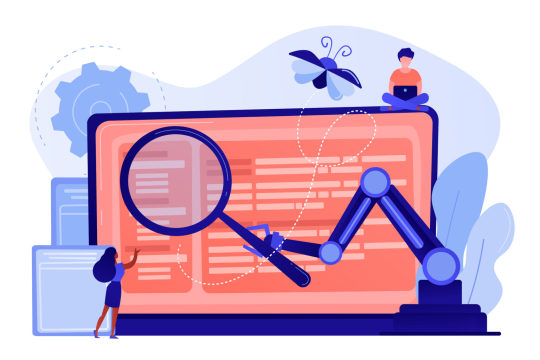#SearchAlgorithm
Explore tagged Tumblr posts
Text
𝗥𝗲𝗹𝘆𝗶𝗻𝗴 𝗼𝗻𝗹𝘆 𝗼𝗻 𝗺𝗲𝘁𝗮 𝘁𝗮𝗴𝘀 𝗳𝗼𝗿 𝗿𝗮𝗻𝗸𝗶𝗻𝗴? 𝗗𝗼𝗻'𝘁... 𝘀𝘁𝗿𝗼𝗻𝗴 𝗰𝗼𝗻𝘁𝗲𝗻𝘁 𝗺𝗮𝗸𝗲𝘀 𝘁𝗵𝗲 𝗱𝗶𝗳𝗳𝗲𝗿𝗲𝗻𝗰𝗲. While meta tags are undeniably critical in SEO, but they alone cannot promise a high ranking on search engine results page. As digital marketing professionals, we must focus on something far more elemental — strong, relevant content. Why? Here’s the thing: 1️⃣ 𝐔𝐬𝐞𝐫 𝐄𝐱𝐩𝐞𝐫𝐢𝐞𝐧𝐜𝐞: High-quality content not only helps to engage visitors but also cultivates trust and credibility with your audience. Remember, 'Content is King'. 2️⃣ 𝐒𝐞𝐚𝐫𝐜𝐡 𝐀𝐥𝐠𝐨𝐫𝐢𝐭𝐡𝐦𝐬: Google's BERT update prioritizes understanding user intent over keyword density or meta tag optimization. If your content resonates with the user's query, you are more likely to rank higher. 3️⃣ 𝐒𝐨𝐜𝐢𝐚𝐥 𝐄𝐧𝐠𝐚𝐠𝐞𝐦𝐞𝐧𝐭: Engaging content sparks conversations and sharing on social channels which indirectly bolster your SEO efforts. 4️⃣ 𝐁𝐮𝐢𝐥𝐝𝐢𝐧𝐠 𝐋𝐢𝐧𝐤𝐬: Exceptional content is naturally link-worthy. Others will want to reference it in their own posts, fostering genuine backlinks that increase site authority. The main point? Don't rely solely on metadata for SEO — instead balance it with meaningful and value-adding content that engages and serves your audience effectively! #SEO #ContentIsKing #DigitalMarketingTips Let me know if you want to discuss more about effective digital marketing strategies! Feel free to comment or message me.
#SEO#ContentIsKing#DigitalMarketingTips#UserExperience#TechLookBD#HighQualityContent#SEOstrategy#EngagingContent#GoogleSEO#SearchAlgorithm#BERTupdate#LinkBuilding#ContentMarketing#SEOExperts#SocialEngagement#TrustAndCredibility#SEOCommunity
0 notes
Text
What is Google algorithm?
Understanding Google's Algorithm: A Deep Dive into the Mechanics of the World’s Leading Search Engine
Introduction
In the present advanced age, the expression "Google it" has become inseparable from looking for data on the web. However, when you type a query into Google, exactly what happens? The response lies in the complex and always advancing system known as the Google algorithm. This modern framework decides the request for indexed lists and impacts what a large number of individuals see when they browse the web. Anyone interested in the workings of the internet, not just digital marketers and SEO professionals, should have a solid understanding of the Google algorithm.
What is the Google Algorithm?
The Google algorithm is, at its center, a bunch of rules and formulas that Google uses to rank sites because of an inquiry question. Based on search queries, the algorithm aims to provide users with the most relevant and useful information. It does this by evaluating, dissecting, and positioning the substance from billions of site pages, utilizing different elements to judge how well those pages match the client's pursuit aim.
The algorithm used by Google is never static; it is dynamic and continually advancing. In order to combat spam and keyword stuffing and increase the accuracy of search results, Google has made thousands of minor and major updates to its algorithm over time.
The Evolution of Google’s Algorithm
The Development of Google's Algorithm Since its inception in the late 1990s, Google's algorithm has undergone significant changes. We can appreciate the current algorithm's complexity and sophistication by comprehending this evolution.
1. The Early Days: PageRank
PageRank's algorithm was relatively straightforward in comparison to today's standards when it was first established in 1998. The foundation of the early Google calculation was PageRank, a framework created by Google's fellow benefactors, Larry Page and Sergey Brin. PageRank assessed the significance of a page in view of the amount and nature of connections highlighting it. The thought was that a page with additional inbound connections from legitimate sources would be viewed as more definitive and significant.
PageRank was groundbreaking at the time, but it had limitations. It didn't represent the nature of the substance or the setting wherein the connections were put, prompting rehearses like connection ranches, where sites falsely swelled their rankings by securing huge quantities of bad quality connections.
2. The Introduction of Semantic Search
As the web developed and client assumptions advanced, Google perceived the need to move past straightforward connection examination.The Hummingbird update, a significant redesign of Google's calculation that noticeable the start of semantic hunt, was delivered in 2013. Semantic search considers the purpose of a user's query rather than simply matching keywords. This update made it possible for Google to provide more accurate results by taking into account the context and meaning of words. This was a big step toward making the user experience better.
3. The Rise of Machine Learning: RankBrain
In 2015, Google presented RankBrain, a computerized reasoning (simulated intelligence) framework that obvious a huge change in how list items were handled. RankBrain is an AI part of the calculation that helps Google decipher and answer complicated or equivocal questions.RankBrain gains from information and can change after some time, rather than ordinary calculations that depend on foreordained rules. Google's web search tool turns out to be more easy to use and responsive because of this capacity, which empowers it to deal with questions it has never managed.
4. The Focus on Quality: Panda and Penguin Updates
Google has additionally executed explicit calculation updates to resolve issues like bad quality substance and manipulative Web optimization rehearses. The Panda update, presented in 2011, designated locales with slender or copy content, compensating superior grade, unique substance with better rankings. Websites that engaged in black-hat SEO practices like keyword stuffing and unnatural link building were targeted by the 2012 Penguin update.
By prioritizing relevance and quality over quantity and manipulation, these updates emphasized Google's commitment to providing users with the best possible search experience.
How Google’s Algorithm Works Today
The modern Google algorithm is a perplexing transaction of different elements, each adding to how pages are positioned. While the specific details of the algorithm are carefully hidden mysteries, a few key parts are known to assume a pivotal part.
1. Crawling and Indexing
Before a page can be included in the search results, Google's web crawlers—also known as spiders or bots—must find and evaluate it. Crawling is the interaction by which these bots filter the web to see as new or refreshed content. A page is added to Google's index, a massive database of web pages, after it has been crawled.
Google looks at the page's text, images, and metadata during indexing to figure out what the page is about. The page is then matched to relevant queries using this information.
2. Ranking Factors
When a page is recorded, Google's algorithm considers it in contrast to many ranking factors to decide its situation in list items. While Google does not disclose the full rundown of ranking elements, probably the main ones include:
Relevance: how well a page's content matches the user's query.
Authority: The validity and reliability of a page, are often determined by the quality of inbound links.
Experience for Users: Factors like page load speed, versatility, and site engineering influence how clients cooperate with a page.
Qualitative Content: The page's originality, breadth, and utility of the content.
Engagement: metrics that show how users interact with a page, such as click-through rates (CTR) and dwell times.
3. Personalization and Localization
To tailor search results to each user, Google's algorithm also takes personalization and localization factors into account. Personalization includes utilizing information like inquiry history, area, and gadget type to convey more significant outcomes. For instance, a client looking for "best restaurants" will see various outcomes given their area.
Limitation, then again, focuses on giving geologically important outcomes. Even if the query is the same, a search for "plumbers near me" will produce different outcomes based on the user's location.
The Role of Algorithm Updates
The algorithm of Google is never static; It is regularly updated to combat new difficulties and enhance search quality. A few updates are minor and slip through the cracks by most clients, while others are huge and can significantly affect search rankings.
1. Core Updates
Core updates are broad modifications to the algorithm that have a significant impact on search rankings and are released by Google on a regular basis. These updates are intended to work on the general nature of query items, frequently by refining how Google deciphers content and client plan. Center updates can cause vacillations in rankings, and sites might have to change their Website optimization systems to line up with the new changes.
2. Targeted Updates
Google releases targeted updates in addition to core updates that aim to address specific issues or enhance certain aspects of the search experience. For instance, the Versatile update in 2015 focused on dynamic sites in list items, mirroring the developing significance of portable perusing.
Similar to this, the BERT update in 2019 improved Google's comprehension of natural language queries, particularly those involving prepositions and other context-specific terms. Google is able to better comprehend the nuances of human language thanks to a deep learning model called BERT (Bidirectional Encoder Representations from Transformers), which results in more accurate search results.
How to Optimize for Google’s Algorithm
To optimize content for better search rankings, website owners and digital marketers must comprehend Google's algorithm. An efficient SEO strategy can be guided by a few fundamental principles, even though the algorithm's specifics are intricate and constantly evolving.
1. Focus on Quality Content
Content is as yet lord with regards to Website design enhancement. It is more likely that content of a high quality that is original and valuable to users will rank well in search results. This implies making content that is useful, well-informed, and applicable to your main interest group. Additionally, it involves avoiding practices that could result in penalties, such as keyword stuffing or duplicate content.
2. Optimize for User Experience
Google puts a high accentuation on client experience, so it's fundamental to guarantee your site is not difficult to explore, quick stacking, and versatile. This incorporates advancing page speed, further developing site design, and guaranteeing your site is responsive across various gadgets.
3. Build Authority Through Links
SEO still relies heavily on link building. Acquiring top notch backlinks from respectable sources can support your site's position and work on its positioning. However, rather than resorting to manipulative strategies, it is essential to concentrate on natural link-building strategies like creating shareable content.
4. Leverage Data and Analytics
To remain in front of calculation transforms, it's essential to routinely screen your site's exhibition utilizing devices like Google Examination and Google Search Control Center. These tools show you where you can make improvements, which keywords are driving traffic, and how users interact with your site.
The Future of Google’s Algorithm
As innovation keeps on developing, so too will find out about calculation. The eventual fate of search is probably going to be formed by headways in simulated intelligence, AI, and regular language handling. These technologies will enable Google to provide search results that are even more personalized and pertinent, as well as to better comprehend user intent.
It is anticipated that voice search and the integration of AI-powered assistants like Google Assistant will also play a larger role in the future of search. This implies that upgrading for voice inquiries, bringing up happiness that answers explicit doubts, and taking into account the visual parts of search (like picture and video streamlining) will turn out to be progressively significant.
Conclusion
Google's algorithm is a complex and dynamic framework that lies at the core of the world's most well-known web index. Understanding how it functions, from the fundamentals of crawling and indexing to the complexities of ranking variables and algorithm refreshes, is fundamental for anybody hoping to prevail in the advanced scene. By focusing on quality content, improving client experience, and remaining informed about algorithm changes, website owners and digital marketers can explore.
#GoogleAlgorithm#SEO#SearchEngineOptimization#GoogleUpdate#AlgorithmUpdate#SEOTips#DigitalMarketing#ContentMarketing#RankBrain#GoogleSearch#SERP#SearchAlgorithm#GoogleRanking#SEOTrends#WebTraffic#SEOstrategy#SearchEngin
0 notes
Text
Dive into the February SEO rollercoaster with us! From whispers of a looming algorithm update to webmaster woes, we've got the scoop on what went down. Buckle up and get the latest insights from the SEO community.
#SEO#SearchAlgorithm#GoogleUpdate#FebruarySEO#DigitalMarketing#SERP#Webmasters#IndustryInsights#AlgorithmicChanges#SEONews#SearchRanking
1 note
·
View note
Text

Exploring the Basics: Introduction to Search Algorithms
Search algorithms are fundamental tools in computer science that enable us to find specific pieces of information within a dataset efficiently. Whether it’s locating a name in a phone book or finding the shortest route on a map application, search algorithms play a crucial role in countless real-world scenarios.
#SearchAlgorithms#ComputerScience#DataSearch#EfficientSearch#TechExplained#BlissMarcom#DigitalMarketingNoida#MarketingExpertsDelhiNCR#BestMarketingAgency#OnlineBranding
0 notes
Text
Is Google Favoring Content Over Relevance? Why AI Tools Like ChatGPT Provide Better Results
For years, the phrase “Content is King” has driven SEO strategies. Websites that focus on long-form, keyword-rich content tend to rank higher in search engine results, even if they don’t provide the most relevant answers to a user’s query.
1 note
·
View note
Link
A recent report by the Financial Times sent shockwaves through the digital landscape. The report suggests Google, the undisputed king of search engines, might be considering a fundamental change in its business model. This potential shift involves introducing advanced search features powered by Artificial Intelligence (AI) as a paid service. While the specifics remain under wraps, this news raises intriguing questions about the future of online search and user behavior. Demystifying the Potential Paid Features: What Could They Be? The nature of the proposed AI-powered features remains undisclosed. However, based on current trends and Google's existing advancements in AI technology, we can make some educated guesses. Here are some possibilities: Google Search Enhanced Search Queries: Imagine a world where you don't just type keywords but ask complex questions and receive insightful, AI-generated summaries alongside traditional search results. This could revolutionize research and information gathering. Personalized Search Filtering: AI could analyze your past searches and preferences to curate results that are more relevant and tailored to your specific needs. This personalized approach could save you time and effort in navigating vast amounts of information. In-Depth Topic Exploration: AI could provide deeper dives into search topics, offering contextually relevant information and connections that might not be readily apparent through traditional searches. This could be invaluable for researchers, students, and anyone seeking a comprehensive understanding of a specific subject. These are just a few potential examples. The true nature of the AI-powered features will ultimately depend on Google's development efforts and its understanding of user needs. Responding to User Demand: The Rise of AI-Powered Search Google's exploration of premium search functionalities can be seen as a response to a growing user demand: the desire for more sophisticated and insightful search experiences. The popularity of tools like OpenAI's ChatGPT exemplifies this trend. Users are increasingly seeking search results that go beyond simple links and offer deeper understanding and context. Google itself has already taken a step towards this AI-powered future with its Search Generative Experience (SGE), launched in May 2023. SGE provides AI-generated summaries alongside traditional link-based results. However, currently, SGE functions as an opt-in feature, not a mandatory element of Google Search. Striking a Balance: Innovation, Revenue, and User Adoption The introduction of AI-based paid search functionalities presents a complex challenge for Google. On one hand, it represents an innovative step forward, harnessing the power of AI to enhance the user experience. However, this shift also raises questions about Google's core advertising revenue model. Extensive computational resources are required to integrate AI processes into search operations. A paywall for advanced features could provide a sustainable way to offset these costs. The success of this potential paywall hinges on several factors. First, Google needs to ensure the AI functionalities are genuinely valuable and provide a clear benefit to users. Second, user willingness to pay for these features is a critical unknown. While some users might embrace the efficiency and convenience of AI-powered search, others might be resistant to paying for a service that has traditionally been free. Google will need to carefully evaluate user preferences and strike a delicate balance between offering valuable features and ensuring user adoption of the paid model. The Road Ahead: Questions and Considerations The potential introduction of paid features for advanced search functionalities sparks several questions that only time can answer: What will the pricing model look like? Will Google offer tiered subscriptions or a pay-per-use model? How will the paid features integrate with the existing Google Search experience? Will there be a clear distinction between free and paid functionalities? Will Google offer a free tier with limited AI features? This could help maintain accessibility while introducing users to the benefits of AI-powered search. Ultimately, the success of this potential shift depends on Google's ability to navigate these complexities. The company will need to ensure user trust, value for money, and seamless integration of AI-powered features within the existing search experience. Frequently Asked Questions Is Google planning to charge for all search results? Based on current information, it appears Google will continue to offer a free basic search experience, with premium AI features potentially offered as a paid service. Why would I pay for Google Search when it's always been free? The paid features could offer significant advantages, such as personalized search filtering, in-depth topic exploration, and AI-generated summaries that provide deeper insights beyond basic links. Will everyone have to pay for Google Search? This remains unclear. Google might offer a free tier with limited functionalities or a pay-per-use model for specific features.
#AIpoweredsearch#Google#GoogleSearch#innovation#onlinesearch#paidsearch#revenuemodel#searchalgorithms.#searchengine#subscriptionmodel#userdemand
0 notes
Text
Day 5 of Digital Marketing Learning What’s a search engine? Imagine a super-smart librarian that knows everything on the internet. It helps you find the exact page or info you’re looking for. Curious to learn more? Watch now
! #SearchEngine #SearchEngineOptimization #WebSearch #OnlineSearch #InternetSearch #SearchResults #SearchTechnology #SEO #SearchTools #GoogleSearch #BingSearch #DigitalSearch #WebIndexing #SearchQuery #InternetExplorer #OnlineDiscovery #WebCrawler #DigitalNavigation #SearchAlgorithms #SearchEngineMarketing
0 notes
Text
youtube
Google’s AI-Driven Results. Explore how Google’s once-simple keyword system evolved into a sophisticated AI-driven powerhouse—shaping the digital landscape for billions of users worldwide. https://www.youtube.com/channel/UC3o4B5eoAcewBjxvaeC5Rxg?sub_confirmation=1 Google launched its journey in 1998 with a clear mission: organize the world’s information. Initially, its search algorithm relied heavily on basic keyword matching, which satisfied early internet users. However, the rapid growth of web content demanded a more nuanced approach. Google responded by introducing PageRank, a groundbreaking idea that measured a website’s importance based on the number (and quality) of links pointing to it. Over time, as spam and low-quality sites threatened to dilute search results, Google implemented significant algorithmic updates. The Panda update, launched in 2011, combated thin or duplicate content, ensuring higher-quality websites appeared in top results. The subsequent Penguin update took aim at link schemes, penalizing websites that manipulated links to artificially boost their rankings. These updates reinforced Google’s commitment to providing an optimal user experience, emphasizing genuine, high-quality content over short-term SEO tricks. Today, Google’s search algorithm incorporates artificial intelligence at its core. Advanced machine-learning models like RankBrain and BERT analyze user intent, refining results to feel more personalized than ever. From identifying complex queries to delivering localized results, Google’s ability to cater to individual preferences has turned it into a daily necessity for billions of users. As content on the web grows exponentially, the company consistently tweaks and refines its systems, making search more relevant, secure, and useful. So, what’s next for Google? The company’s track record shows continuous advancements—integrating voice search, image recognition, and advanced natural language processing. As technology evolves, Google is likely to expand beyond traditional text-based queries, diving deeper into visual and conversational interfaces. And while the algorithm matures, Google’s core principle remains: delivering the highest-quality, most relevant results to every user, every time they search. 📂 For The Latest Stories on luxury travel, getaways goods, the rich, companies, Top 10’s, biographies, Lavish History, news, and more 📂 https://www.youtube.com/@Lavishangle 🎉 For business enquires contact us at full4sog (@) gmail dot com 💬 Don't forget to leave your thoughts in the comments below. We love hearing from you! 😍 and hit that bell to stay updated on all new videos we release. #lavishgetaways #thelavishandaffluentangle #thelavish&affluentangle #tlaa #shorts #shortsvideo #shortsbeta #viralshorts #viral #viralreels #youtubeshorts #viralyoutubeshorts #GoogleSearch #SearchAlgorithm #PageRank #KeywordMatching #PandaUpdate #PenguinUpdate #QualityContent #AIinSearch #RankBrain #BERT #UserExperience #SpamControl #SEOGame #SearchEngineUpdates #GoogleEvolution #DigitalLandscape #LinkBuilding #ContentMarketing #HighQualitySites #OnlineSearch #SearchTechnology #SearchResults #MachineLearning #NLPTech #VoiceSearch #SearchFuture via The Lavish & Affluent Angle https://www.youtube.com/channel/UC3o4B5eoAcewBjxvaeC5Rxg January 29, 2025 at 12:00AM
#lavishgetaways#luxurylifestyle#luxuryhotels#luxurytravel#luxuryliving#traveltheworld#travelgoals#Youtube
0 notes
Photo

Google has confirmed that the core algorithm update, which it started rolling out on May 25, is now officially complete.👨💻👩💻
Via: @sejournal
Discusses how core updates can affect your online performance:
👉https://bit.ly/3NI1j3f
#ascuretech#Google#googlecoreupdate2022#GoogleCoreUpdate#seo#content#ai#DigitalMarketing#seonews#coreupdate#coreupdate2022#searchalgorithm#MayUpdate#searchupdate2022
2 notes
·
View notes
Text
Black Keys
This artwork is based on a pattern generated on a webapp called 'Hurna exporer'. From this pattern I like the endings that consistently have two positions, which made me think of piano keys.
Well, take a look around this post, I hope you enjoy it!
Facts: Height: 60 cm / 23,6 inch - width: 60 cm / 23,6 inch - depth: 3 cm / 1,2 inch - weight: 3,0 kg - paint (base): warm black (chalk) - relief: hardfoam (styrodur xps) - frame: plain board - estimated hours work: about 30 over a period of 3 weeks.




#black keys#blackkeys#doolhof#labyrinthz#barrybouman#art#maze#mazeart#algorithmart#searchalgorithm#searchtechnique
2 notes
·
View notes
Text
𝗠𝗼𝗿𝗲 𝗸𝗲𝘆𝘄𝗼𝗿𝗱𝘀 𝗺𝗲𝗮𝗻 𝗮 𝗵𝗶𝗴𝗵𝗲𝗿 𝗿𝗮𝗻𝗸, 𝗿𝗶𝗴𝗵𝘁? 𝗡𝗼𝘁 𝗶𝗳 𝘆𝗼𝘂 𝗼𝘃𝗲𝗿𝘀𝘁𝘂𝗳𝗳 𝗮𝗻𝗱 𝘀𝗽𝗮𝗺. A common misconception prevailing in the SEO community is that '𝐭𝐡𝐞 𝐦𝐨𝐫𝐞 𝐤𝐞𝐲𝐰𝐨𝐫𝐝𝐬 𝐲𝐨𝐮 𝐮𝐬𝐞, 𝐭𝐡𝐞 𝐡𝐢𝐠𝐡𝐞𝐫 𝐲𝐨𝐮𝐫 𝐜𝐨𝐧𝐭𝐞𝐧𝐭 𝐰𝐢𝐥𝐥 𝐫𝐚𝐧𝐤.’ It's time for a reality check - 𝐤𝐞𝐲𝐰𝐨𝐫𝐝 𝐬𝐭𝐮𝐟𝐟𝐢𝐧𝐠 𝐜𝐚𝐧 𝐝𝐨 𝐦𝐨𝐫𝐞 𝐡𝐚𝐫𝐦 𝐭𝐡𝐚𝐧 𝐠𝐨𝐨𝐝! ⚠️ Yes, keywords are critical to help search engines understand your content. However, overstuffing your articles with excessive and irrelevant keywords just to trick algorithms not only results in a poor user experience but can also lead to ranking penalties from Google. 🔑 The key lies in creating value-driven and audience-relevant content. It’s about prioritizing '𝐮𝐬𝐞𝐫 𝐢𝐧𝐭𝐞𝐧𝐭' over '𝐤𝐞𝐲𝐰𝐨𝐫𝐝 𝐝𝐞𝐧𝐬𝐢𝐭𝐲'. 🌐 As the world of SEO evolves, search engine algorithms are getting smarter at understanding context and relevance. They can separate quality content from keyword-stuffed spam. 💡 Let's shift our focus towards a more holisticSEO strategy: 1️⃣ Understand and align with 𝐮𝐬𝐞𝐫 𝐢𝐧𝐭𝐞𝐧𝐭. 2️⃣ Create comprehensive, engaging and 𝐡𝐢𝐠𝐡-𝐪𝐮𝐚𝐥𝐢𝐭𝐲 𝐜𝐨𝐧𝐭𝐞𝐧𝐭. 3️⃣ Use 𝐫𝐞𝐥𝐞𝐯𝐚𝐧𝐭 𝐥𝐨𝐧𝐠-𝐭𝐚𝐢𝐥 𝐤𝐞𝐲𝐰𝐨𝐫𝐝𝐬 naturally within the context. 4️⃣ Consider 𝐬𝐞𝐦𝐚𝐧𝐭𝐢𝐜 𝐒𝐄𝐎 𝐩𝐫𝐚𝐜𝐭𝐢𝐜𝐞𝐬 – using related terms, synonyms, etc. Let's remember – at the heart of every online search is a human being seeking useful information. Let's prioritize their needs over manipulating algorithms! Curious to hear how others are striking balance while integrating SEO into their content strategy? Your thoughts create discussions. Drop them below! #DigitalMarketing #UserExperience #OnlineRanking #SEOStrategy
#SEO#KeywordStrategy#ContentOptimization#SEOTruths#SEOCommunity#TechLookBD#QualityContent#GoogleSEO#UserIntent#SearchAlgorithms#HolisticSEO#SemanticSEO#SEOExperts#ContentStrategy#AvoidKeywordStuffing#DigitalMarketingTips#OnlineVisibility#SEOAdvice#SEOInsights#SearchEngineMarketing
0 notes
Photo

Now with the time, most searchers use mobile, and over 50% of all Google searches being on mobile. . That's why Google decided to remove Google Instant, so google can focus on ways to make Search even faster and more fluid on all devices. . Now as you type, you will only see search suggestions and then be able to click on those suggestions to see the results. The search results will not load any result pages without clicking on a search suggestion or clicking enter. . #google #googlesearch #googleinstant #instantresult #search #suggestions #queries #typing #fastresult #algorithm #searchalgorithm #seo #ranking #seoservices #seotips #seoexperts #otfcoder #otfcodermarketingservices https://www.instagram.com/p/B_ZKJ3nghW_/?igshid=4m04tvcjb5m7
#google#googlesearch#googleinstant#instantresult#search#suggestions#queries#typing#fastresult#algorithm#searchalgorithm#seo#ranking#seoservices#seotips#seoexperts#otfcoder#otfcodermarketingservices
0 notes
Photo

Searching and Replacing word/words in a sentence. Search and replace algorithms are used in word processing applications to create notes, and many other stuff. In this set of slides set we look at how we can solve and implement such a challenge. #javascriptalgorithms #searchalgorithms #replacealgorithms #javascriptdatastructures #frontenddevelopment #webdevelooment #programmingchallenges (at Lilongwe, Malawi) https://www.instagram.com/p/CEjw4jHBUML/?utm_medium=tumblr
#javascriptalgorithms#searchalgorithms#replacealgorithms#javascriptdatastructures#frontenddevelopment#webdevelooment#programmingchallenges
0 notes
Photo

Searching and Replacing word/words in a sentence. Search and replace algorithms are used in word processing applications to create notes, and many other stuff. In this set of slides set we look at how we can solve and implement such a challenge. #javascriptalgorithms #searchalgorithms #replacealgorithms #javascriptdatastructures #frontenddevelopment #webdevelooment #programmingchallenges (at Lilongwe, Malawi) https://www.instagram.com/p/CEjw4jHBUML/?igshid=1qj3agh0vhg2g
#javascriptalgorithms#searchalgorithms#replacealgorithms#javascriptdatastructures#frontenddevelopment#webdevelooment#programmingchallenges
0 notes
Link
In artificial intelligence, the search algorithm is used to assess problem space and various sequence of actions.
0 notes
Text
A Google Search Algorithm Update Over December 15th Weekend
Read more: https://bit.ly/2EoYwv7
Visit: https://www.technoinfonet.com/hire-seo-experts

0 notes